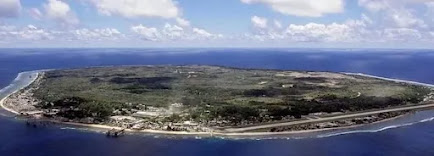From Paradise to Obesity: The Tragic Tale of Nauru, the Fattest Country on Earth
Introduction:
Welcome, friends, to the shocking story of the world's most obese country. When we think of obesity, our minds often drift to the United States. However, the title of the fattest nation actually belongs to a small island in the Pacific Ocean - Nauru. With a staggering 61% of its population suffering from obesity and a whopping 90% classified as overweight, Nauru stands as a cautionary tale of how a once pristine paradise succumbed to the grips of a devastating health crisis.
The Dreadful Impact of Crony Capitalism:
How did this tiny island nation fall victim to such alarming rates of obesity? The answer lies in a tale of greed and exploitation. Companies driven by profit cared little for the health of the people as long as money poured in. Nauru's tragic story is intertwined with the concept of crony capitalism, where the interests of a few outweighed the well-being of the entire nation.
Understanding Obesity:
The Difference Between Overweight and Obese: To comprehend the severity of the issue, it's crucial to understand the distinction between being overweight and being obese. Body Mass Index (BMI) is a common indicator used to determine this. Calculating BMI is a straightforward process, and it can provide valuable insights into your health. This article provides a step-by-step guide on how to calculate your BMI accurately.
BMI:
More Than Just a Number: While BMI offers a quick assessment of weight status, it's essential to remember that it is not the sole determinant of overall health. Being in the healthy BMI range doesn't automatically guarantee optimal well-being. Other factors, such as muscle strength, endurance, flexibility, and stamina, should also be considered when evaluating one's fitness level. This section delves into the complexities of health assessment beyond BMI.
The Perils of Obesity:
A Gateway to Disease: Extensive research and studies have linked obesity to numerous health risks, including type II diabetes, hypertension, heart disease, stroke, and certain types of cancer. Obesity is not just a cosmetic concern but a significant contributor to various life-threatening conditions. This section highlights the grave consequences associated with obesity and emphasizes the importance of addressing the issue.
The Most Obese Countries:
Nauru's Tragic Journey:
Let us now turn our focus to Nauru and explore its unique story. Once an untouched island of natural beauty, Nauru fell prey to exploitation when phosphate reserves were discovered. Foreign powers seized control, ravaging the land and leaving behind a trail of destruction. With the depletion of phosphate reserves and mismanagement of resources, Nauru's economy plummeted, resulting in severe unemployment and environmental devastation.
The Fallout: From Riches to Ruin:
As phosphate mining came to a halt, Nauru's government sought alternative means to sustain its economy. One of the most controversial decisions was to establish a refugee detention center in partnership with Australia. The economic gains were short-lived, overshadowed by international scrutiny of the inhumane living conditions for detainees. Meanwhile, the island's ecological damage and limited access to clean drinking water exacerbated the health crisis.
about a significant shift in dietary patterns. Traditional Nauruan cuisine, once rich in fresh seafood, fruits, and vegetables, was replaced by an influx of cheap and highly processed junk food. Fast food chains and convenience stores proliferated, offering calorie-dense and nutrient-poor options that became the norm for Nauruan's.
If you want to lose weight, Then You can try this Product it's really effective.
The Rise of Non-Communicable Diseases:
With the introduction of a Westernized diet, Nauru experienced a surge in non-communicable diseases (NCDs) such as obesity, diabetes, and cardiovascular problems. The lack of nutrition education and the availability of affordable, unhealthy food created a vicious cycle of poor dietary choices and deteriorating health. Nauru's healthcare system, ill-equipped to handle the growing burden of NCDs, struggled to provide adequate care for its population.
The Cultural Impact:
Nauru's obesity crisis had profound cultural implications as well. Traditional cultural practices, such as fishing and farming, were overshadowed by sedentary lifestyles and a dependence on imported goods. The prevalence of obesity began to erode the once-strong sense of identity and pride among Nauruan's, leading to a loss of cultural heritage and a disconnection from their roots.
Addressing the Crisis:
A Call to Action: Recognizing the severity of the situation, both the Nauruan government and international organizations have taken steps to address the obesity crisis. Efforts have focused on promoting healthier eating habits, increasing physical activity, and raising awareness about the long-term consequences of obesity. Sustainable agriculture initiatives and community-based programs have been implemented to revive traditional food practices and improve access to nutritious options.
Challenges and Opportunities:
Despite these efforts, several challenges remain. Nauru's limited resources and infrastructure pose significant obstacles to implementing comprehensive solutions. The nation's economic dependency on unhealthy industries, such as phosphate mining and the refugee detention center, further complicates the path to change. However, the crisis also presents an opportunity for sustainable development, as Nauru seeks to diversify its economy, promote eco-tourism, and invest in healthier food systems.
Conclusion:
Nauru's journey from a pristine paradise to the world's fattest nation is a cautionary tale that highlights the detrimental consequences of unchecked greed and exploitation. The island's struggle with obesity serves as a stark reminder of the importance of prioritizing public health and sustainable development over short-term economic gains. By learning from Nauru's story, we can strive to build healthier, more resilient societies that prioritize the well-being of their people above all else.



Comments
Post a Comment